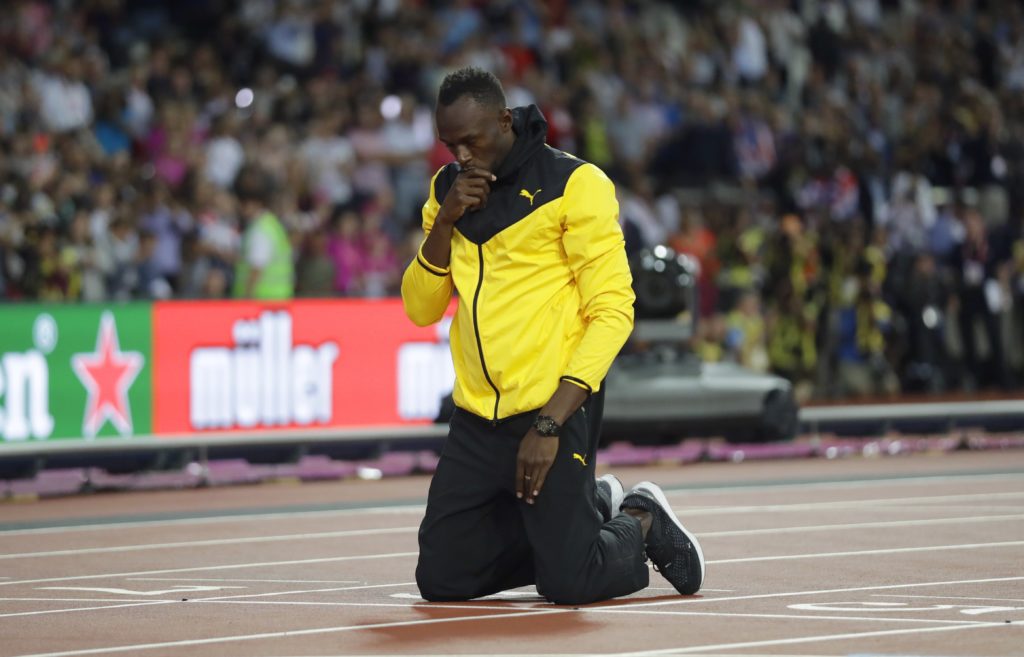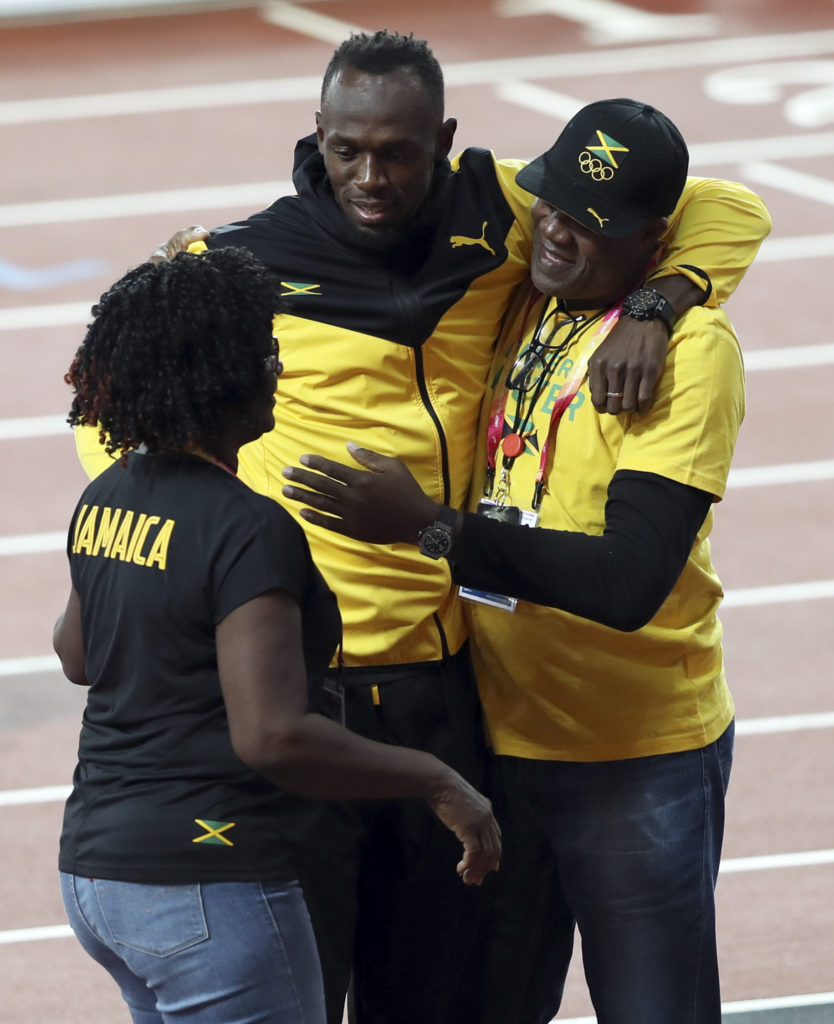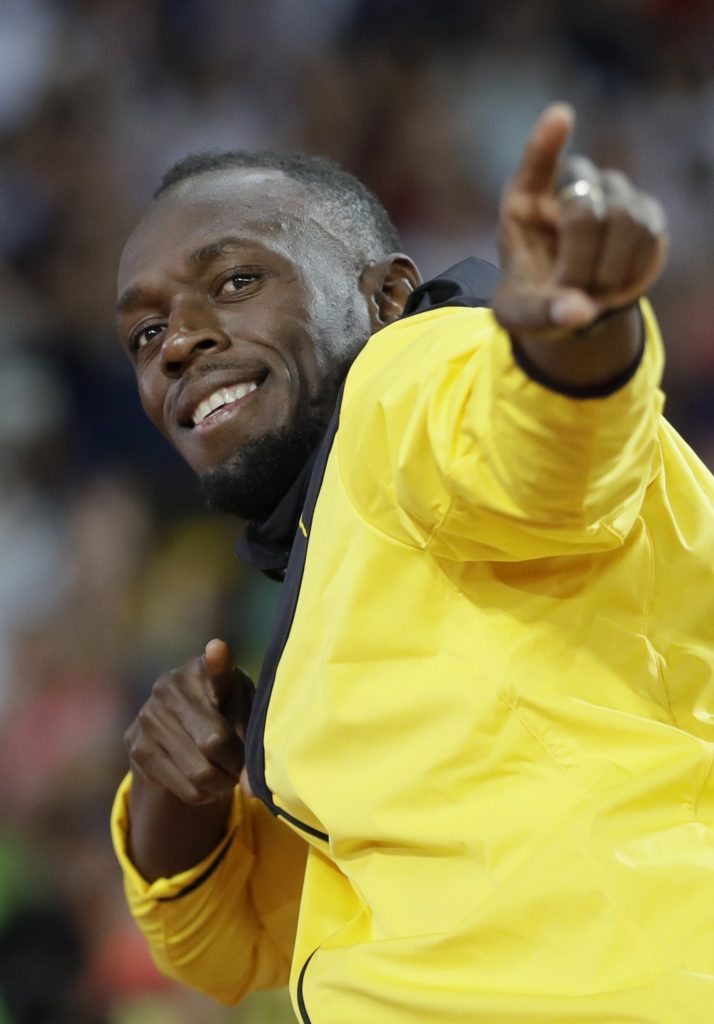
The crowd at the IAAF World Championships at the Olympic Stadium in London held their collective breath; for the final time, they were about to see “Lightning” strike in the same place.
Having announced himself to the athletic world with a victory in his favourite 200m event at the World Junior Championships on home soil in Jamaica in 2002, the towering 6’ 5” sprinter from Sherwood Content, Trelawny, was about to sign off his career in style.
“They say lightning doesn’t strike twice,” the race announcer tells them as Usain St Leo Bolt, his usual playful, cheeky pre-race self, lines up alongside his competitors for his farewell race this August day, “but we have had this Bolt for about ten years.”
Now, he collects the baton from training partner Yohan Blake for the anchor leg of the Men’s 4 x 100m relay…
Last year at the Rio Olympic Games, Bolt brought the curtains down on his magnificent Olympic journey with an eighth gold medal, anchoring Jamaica to 4 x 100m glory in a time of 37.24. And in London in 2012, having collected the baton from Blake, he had stridden majestically away from the USA’s Ryan Bailey on the final leg to take Jamaica to a world record time of 36.84 seconds.
Earlier in the 2017 World Championships, which ran August 4- 13, he had started too slowly in the 100m final, his last individual event, to allow him to make up the ground between him and the leaders, American Justin Gatlin, his drug-sullied long-time rival, and new-boy-out-of-the-blocks Chris Coleman.
At the end of the race, gold medallist Gatlin acknowledged Bolt’s overall superiority, genuflecting before him in the middle of the track.
“You can’t take away anything from him in these Championships,” said Gatlin. “He’s amazing, he’s a legend. He has built such a legacy that a lot of athletes around the world will be able to use going into their career.”
A legend? Before the London 2012 Olympics, then International Olympic Committee (IOC) President Jacques Rogge had told Bolt that he still had some way to go before achieving legendary status; he needed to be dominant over the course of several Olympics.
The generally garrulous Bolt had let his gold track shoes do his talking, becoming the first athlete to win the sprint double at consecutive Olympic Games, following up on his 2008 double in the Beijing Olympics. He had also led a historic sweep for Jamaica in the 200m, Blake and Warren Weir finishing second and third respectively to underline Jamaica’s dominance in the sprint events.
Bolt finds himself trailing Coleman and Great Britain’s Nethaneel Mitchell-Blake. The crowd expects the Jamaican to close the gap although, truth be told, he has generally not had to come from behind in these races.
Never limit yourself
“Anything is possible,” had been Bolt’s motto throughout his stellar career. “Don’t think limits.” Gap notwithstanding, he too must have been thinking final gold here in London.

London had witnessed the birth of Jamaica’s rich Olympic history, quarter-miler Arthur Wint leading a one-two finish for that country in their very first appearance at the Olympic Games in 1948 in the 400m final. Countryman Herbert McKenley finishes second in a time of 46.4, just .2 of a second adrift.
In the almost seventy years since then, the Isle of Springs has steadily become the Isle of Sprinters, amassing a total of 77 Olympic medals. Well-known as the birthplace of reggae, Jamaica has produced a string of great sprinting talent, not all of whom have represented the country of their birth. Among those who have are Don Quarrie (Montreal 1976 200m gold medallist), Deon Hemmings (Atlanta 1996 400m hurdles gold medallist), Veronica Campbell-Brown (eight-time Olympic medallist), Shelly-Ann Fraser-Pryce (six-time Olympic medallist) and Merlene Ottey, the “Godmother” of Jamaican sprinting, who earned nine Olympic medals in an Olympic career which spanned two-and-a-half decades between 1980 and 2004.

Usain Bolt Breaking and Holding World Records
None of them has surpassed Bolt, owner of eight Olympic and 11 World Championships golds. He came on the scene as a highly talented 15-year-old with an awkward running style. By the time he said farewell to track and field in August, the Leo St Leo—he turned 31 on August 21—had, under the guiding hand of Jamaica-based Jamaican coach Glen Mills, changed the face of athletics and won millions of fans the world over with his infectious personality.
“When Usain Bolt wins a race,” says Jamaican reggae artiste Chronixx, in I am Bolt, the documentary that focuses on Bolt’s build-up to Rio 2016, “the whole world feels like they win a race. It’s a feeling I can’t explain.”
And at the 2016 Olympic Games, the sprinter again showed his ability to do the unthinkable, completing the sprint double for a third straight Olympics. For good measure, he also again anchored Jamaica to gold in the 4 X 100m, a truly remarkable achievement. He was, however, bereft of his ninth gold medal, Nesta Carter testing positive for a banned substance and the Jamaicans being stripped of the 4 X 100m title they had won in Beijing in 2008.
In Berlin in the 2009 World Championships, Bolt sped where no man had raced before, scorching the track to win the 100m final in 9.58 before lowering his then existing 200m record of 19.30 to a stunning 19.19 seconds.
As if finishing first in nine Olympic and 11 World Championships races isn’t enough, this extraordinary sprinter still holds both these records.

Today, however, he’s up against it. Eager to get into his usual fluent stride and coast past his opponents down the straightaway, as has been his wont, Bolt arguably asks too much of his hamstring.
He drops to the track, literally rolling in agony. Hosts Great Britain hang on to edge USA for gold.
It is over; Bolt’s magnificent run of sprint victories is over. Injury is added to insult as he takes his first—and final!—exit without a medal.
“Heart-wrenching,” Jamaica’s lead-off runner Omar McLeod described it; “Tragic,” teammate Blake concurred.
Known to aspire to be alongside Muhammad Ali and Brazil’s Pelé, up where the sporting air is really rare, Bolt was disappointed but not devastated. Addressing the media in his last news conference as an active professional athlete, he had already come to terms with his mortality.
Someone said to me Muhammad Ali lost his last fight also,” he says, “so don’t be stressed about that.
“I’ve proven myself year in, year out and I don’t think one championship or one race or the fact that I didn’t end my last race is going to change the fact of what I have done in the sport.”
Once more, Blake, who ran the second-fastest 200m of all time in 2011 when he won World Championships gold in 19.26, concurred.
“He has been carrying Jamaica on his shoulders for how many years?” he asks reporters before addressing Bolt directly. “I can’t kill you for that. You have done it so many times, we just have to send our love and support.”
So what’s USB’s next port of call?
Reports say IAAF President Lord Sebastien Coe has serious plans for Bolt to work representing the IAAF, even though Bolt wasn’t nominated for the organisation’s Athlete of the Year Award this year.
“I’m not sure what I’ll be doing specifically but my agent is talking to Mr Coe to figure out what is the best way I can help the sport,” Bolt said in the August London media session. “I love track and field and it gave me everything I have.”
As he strode off the performance stage before his adoring fans to the strains of Bob Marley’s “Jamming” and “One Love,” he flashed a broad smile and struck his trademark bow and arrow pose.
On the track, at least, Usain the Great has now shot his Bolt.